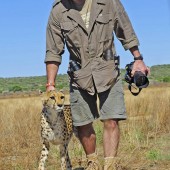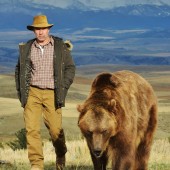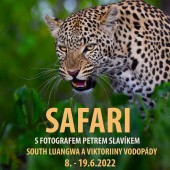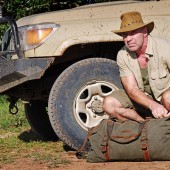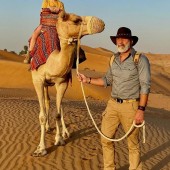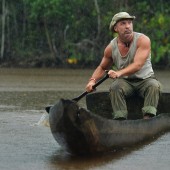Photographer Petr Slavík: Strong experiences well remembered
Feb 7, 2022
Petr Slavík - a photographer with an international reach who’s had several soloexhibitions (Lost World, Memories of Africa, etc.), various awards and lots of charitable activities, and even several books (Close Encounters, etc.)to his credit. But Petr is not just a photographer and traveller. He's a great narrator, a real rebel, a fair dad and a true bushman… not to mention that a large part of his heart is occupied by the bush…
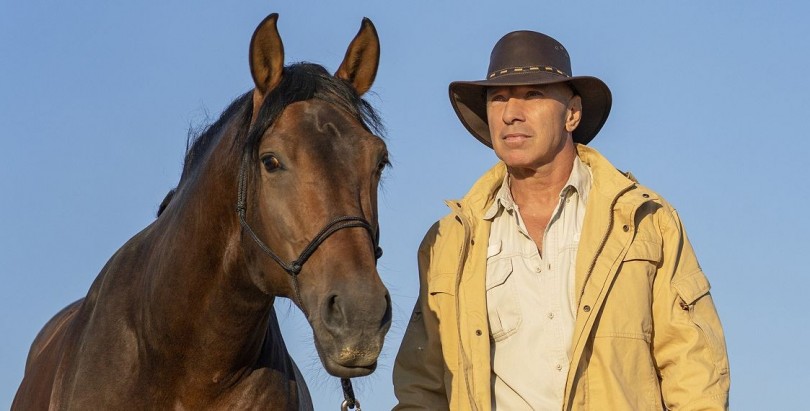
Most of our offices in Bushman are decorated with his pictures of animals: perfect moments that don't need any comment. And if only, asks Peter, "I could remember people as much as I do animals. Here in that photo is "Natrhouško, a female jaguar photographed on my first trip to Brazil. That's how I named her myself. She was dreaming and I realized in a second that everything is nothing - but a sham. Strong experiences are well remembered," he adds.
He doesn't just love his job - he lives it. But he still has enough energy to do a lot of other, crucial things. For example, for his nine-year-old daughter, who experiences each of his expeditions as
the right caring lady.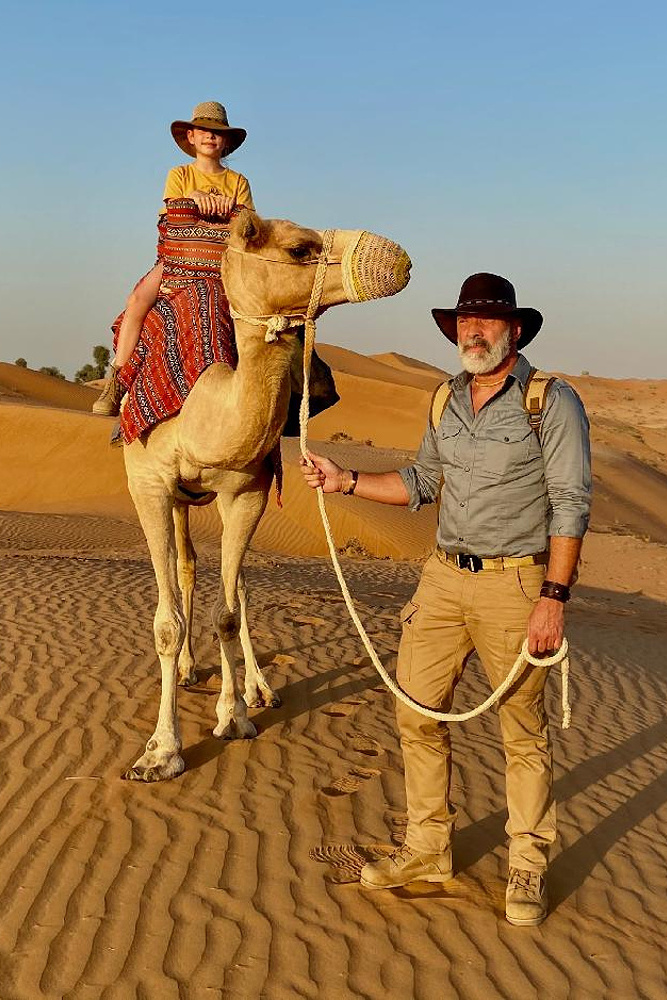 "My daughter is watching over me. There were times when my departures were accompanied by hysterical scenes. That's because I said goodbye. And so I learned to run," says Petr, and then adds that it is all the more beautiful to return. Moreover, he never goes on his solo trips alone: “Every trip, something has secretly sneaked into my backpack. Mostly stuffed animals who are supposed to accompany and protect me," he laughs, and sincere joy is reflected in his eyes.
"My daughter is watching over me. There were times when my departures were accompanied by hysterical scenes. That's because I said goodbye. And so I learned to run," says Petr, and then adds that it is all the more beautiful to return. Moreover, he never goes on his solo trips alone: “Every trip, something has secretly sneaked into my backpack. Mostly stuffed animals who are supposed to accompany and protect me," he laughs, and sincere joy is reflected in his eyes.
"If you were alone, would you stay in Africa?" That fairly logical question comes to my mind. Of course he stayed. Where else could one feel happy and free, claiming that if he were to live someone else's life, it would be George Adamson? "I may end up in Botswana one day, it's my favorite place, but I'm absolutely not willing to give up my daughter's childhood because of Africa," he said. Like I say, this guy is a real fair player…
Where did your initial impulse to explore the wilderness come from? Did someone in your family introduce you to this?
“I didn't have a pedigree, so I don't know if anyone has not fished in Africa in the past, but I probably broke the family mould. I grew up with my grandmother outsidea village, on the very edge of the forest, and that shaped my relationship with Nature. Then, definitely, adventure books. My grandmother used to read them to me, then I read them myself - and I also like to read to my daughter very much. Somewhere during browsing through The Jungle Book and May Day, it was all born.”
Are you a free-spirited soul? I guess you have to be ...
“Now I can say what kind of soul I am, but it’s difficult to describe the soul of a ten-year-old boy. I just wanted to be among the animals… a real headache. I remember, for example, how I sewed a loincloth at the time, that I would run through the woods like Tarzan. So yes, the desire for freedom was there. And my grandmother also gave me considerable freedom.”
Did she also take you on your first trip?
“I went there in the early summer of 1990. I said I would hitch a ride to Africa. Grandma didn't swear, she just said, ‘That's amazing, but take care of yourself’. That journey was an incredible episode... the discovery of the Western world, something unthinkable until then. I drove through Europe as it was opening up and was not surprised. A man got to the road to Prague in the morning and the next day before five he was at the Eiffel Tower!”
I can't imagine that today…
“Yeah, today hardly anyone would stop.”
How did you agree to this expedition? Did you speak any foreign languages?
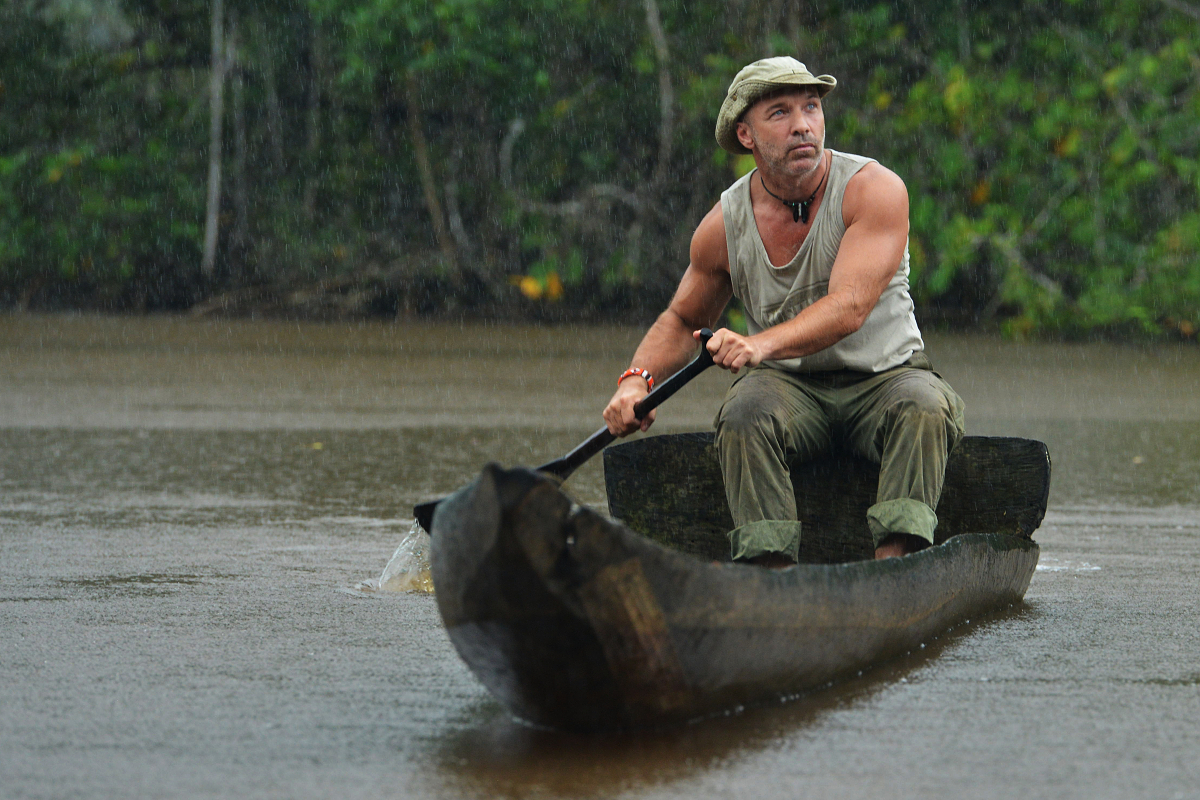 “I learned some English at the gym, so I had the basics, but in practice it was impossible to use it. I learned to speak as I walked along. My second trip led me to Argentina, where I went with my classmate from elementary school. We learned Spanish along the way, and that was incredible. We lived in the ditches, in the mountains, fishing,… It was a powerful experience that literally kicked me
“I learned some English at the gym, so I had the basics, but in practice it was impossible to use it. I learned to speak as I walked along. My second trip led me to Argentina, where I went with my classmate from elementary school. We learned Spanish along the way, and that was incredible. We lived in the ditches, in the mountains, fishing,… It was a powerful experience that literally kicked me
in the butt. Then came other journeys that I then completed myself, namely Chile, Bolivia,… it was the best language and life school.”
Quite an idyll, yes? But as the sky is not without clouds, there are no paths without obstacles. And so I soon learned how Peter reached the very bottom when he got lost in the Andes, ran out of water, got some alpine disease and survived only by a miracle. "To this day, when I close my eyes, I see the endless night sky in the desert mountains. I was lucky to struggle to the rescue cabin and that's where the check came, which comes about twice a year. They had already taken care of me, " he recalls, and I feel relieved for him as well. "I bought grilled chicken and beer there with the dollars I’d saved, and I felt like a king," he says indulgently.
Nevertheless, this experience didn’t shake him in such a way that he’d feel real, genuine and utterly crippling fear. This moment came another time:
"I was almost dragged to my death by a horse in Kazakhstan. We shot the documentary series In the Footsteps of a Predator there. The horse got scared, my foot remained in the stirrup, it completely skinned my leg. The moment hooves and grass flew around my head, I was terribly scared. I was afraid I wouldn't see my daughter again. That was the biggest fear I’ve ever had. At the time, I really thought it was all over for me. "
Some of your experiences are really quite painful. And probably not just for the body…
“Yes, this one was sore in every way. It didn't end with the accident itself. When I woke up, I had to get on that horse again and ride it to Kazakh hospital. Staying at the facility there was perhaps even worse than what had preceded it. I woke up on my back, without clothes, with a sheet stuck to my wounds. I had to take a shower for a long time just to get it off…”
So you prefer to avoid horses by keeping your distance?
“On the contrary! I deliberately try to keep practising so as not to create a block. Unfortunately, so far no one has taught me that much😊. Ale zase dobře padám.
I have one thing to say here. If there is anything wrong with Peter's story, it’s his respect, humility and courage. You would have to be have been here to see his gestures and hear the composure in his voice. No, these really aren't stories made for the readers of magazines. This is life, real life. Of course, Peter tells his actual, raw life, and you feel as if you’ve experienced it with him. The Ideal bushman, I think again… And as long as I've been thinking, I've been quiet for a long time too. Peter does not enter my thoughts, he gives me space. And suddenly I have a question completely outside the themes that we’ve been sticking to so far:
And what about a bear? What should we do when if we were to meet onr? Ring a bell? Freeze? Scream? Play dead?
 “Everything and nothing “(he laughs). Let me tell you something. I've had contact with bears in Kamchatka, Alaska, I've worked with a bear… all ready to shoot it, in fact, and I know one thing: NO ONE is able to say what to do when a bear attacks you. Bears are all individuals. If someone decides to attack bear cubs, you may, for example, stand on your head and still not escape. Adolescent bears, who lack their mother's presence, are also quite OK to make contact… But one rule is worth following: you must not surprise a bear! Therefore, any sound from the bear that alerts you so that he knows that you are there and he’ll probably avoid you. But if you quietly step into his comfort zone, he will attack. It's natural. We wouldn't even like a stranger to enter our living room.”
“Everything and nothing “(he laughs). Let me tell you something. I've had contact with bears in Kamchatka, Alaska, I've worked with a bear… all ready to shoot it, in fact, and I know one thing: NO ONE is able to say what to do when a bear attacks you. Bears are all individuals. If someone decides to attack bear cubs, you may, for example, stand on your head and still not escape. Adolescent bears, who lack their mother's presence, are also quite OK to make contact… But one rule is worth following: you must not surprise a bear! Therefore, any sound from the bear that alerts you so that he knows that you are there and he’ll probably avoid you. But if you quietly step into his comfort zone, he will attack. It's natural. We wouldn't even like a stranger to enter our living room.”
And again his composure! Hardly mentioning a man who gets buried in the snow, waiting for the arrival of a Siberian tiger. And so it occurs to me:
Adrenaline is your daily bread, yes? Are you looking for it when there’s a shortage of it?
“I partly like it, but you can't say I'm out looking for it. I move in places where there is simply a slightly higher concentration of the stuff 😊. But I also like the feeling of well-being during expeditions. For example, such safari camps with people for whom I can be a guide - It’s pleasant relaxation for me. Especially evenings. You’re comfortable, while all around you are the sounds of the African night, having good food and drink…”
But how do you get this across to ordinary people?
“Humility towards Nature is fundamental. When I drive people around Africa on safari, I teach them that this area belongs to the animals that will kill them if they cross their borders. There are a lot of principles that Man, in Nature, especially in the wild, must follow…."
 And they observe these rules?
And they observe these rules?
“Usually the first two or three days. A man who is used to the city and suddenly finds himself in a tent in the middle of Africa is tame. Frightened and tame because he is in the unknown. The first night he usually doesn't even sleep (laughs). The third day comes a turning point and also the first mistakes. All you have to do is run around and the animal, which would not otherwise even notice you, may attack. And it doesn't have to be a beast at all. Errors of inattention are simply not forgiven.”
To go on Safari with Petr Slavík.
“Do you hear, Santa? ... An unforgettable experience. Memories you draw from all your life. And these beautiful plans are not hindered by anyone. A pandemic, for example.”
How did you get on when Covid was roaming the world? For travellers, a pretty decent line through budget, I reckon?
“I sat on my ass for a year. A lot of people take it mentally, whether they are dealing with booze or in other ways. It's terrible.”
Terrible - even for animals?
“Now that I've been to Africa in October, a lot of the camps there are empty, vacant. And this is a really difficult situation, because these are areas that depend on tourism. It's probably better for the animals, but there’s no one to protect them. And there’s no time. And that's too bad. After all, just the population of lions has fallen by as much as 95% since 1943. The prognosis is that the lion in the wild will disappear by 2050… And this is a topic that is not completely addressed in society. Almost no one cares about the extinction of an animal species that has accompanied mankind since time immemorial.”
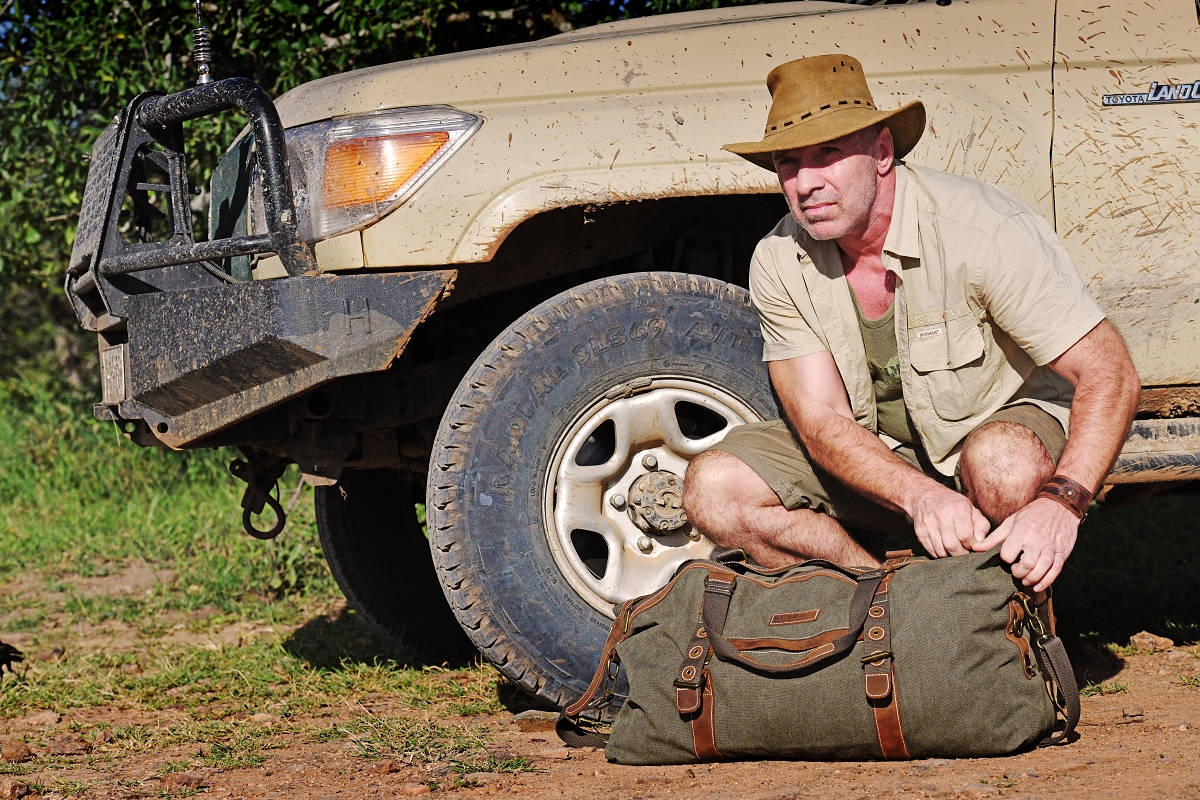 Unless some popular influencer took a picture with him…
Unless some popular influencer took a picture with him…
“Yes, that would be a clever marketing move. In this, the world is completely gone. Take pictures with an animal I don't know anything about, just for the number of likes. What's worse - taking pictures with the trophy, or – of course - hunting directly. I understand regulatory hunting or for a living, but photos with a dead baboon just for fun… that's just beyond.”
“Beyond the edge... the world is not so slowly going over the edge, I think, but I'd rather not say anything out loud. I don't want to spoil this beautiful and inspiring moment”. I glance at Peter's face and see that he’s thinking the same thing. The Pandemic: a divided society. Animals that can't do anything about it.
What are your plans for this year? - I ask after a moment. A bold question given that we just don’t know what will happen tomorrow, let alone throughout the year…
“Apart from Zambia, where I’m going on an expedition with clients, I have been planning an expedition to the Arctic for two years now. Maybe it will finally work out. I would like to get somewhere on the 80th parallel and during the cruise I took pictures of animals and nature, which a lot of people think is boring. But when the sun shines right into it, it's a beautiful sight! In October, I would like to go on a tent safari in Botswana. This is absolutely a TOP place for photography.”
Oh yes, your photos! They should definitely get in our conversation somewhere. These are amazing moments. And a layman can hardly imagine what is behind getting them...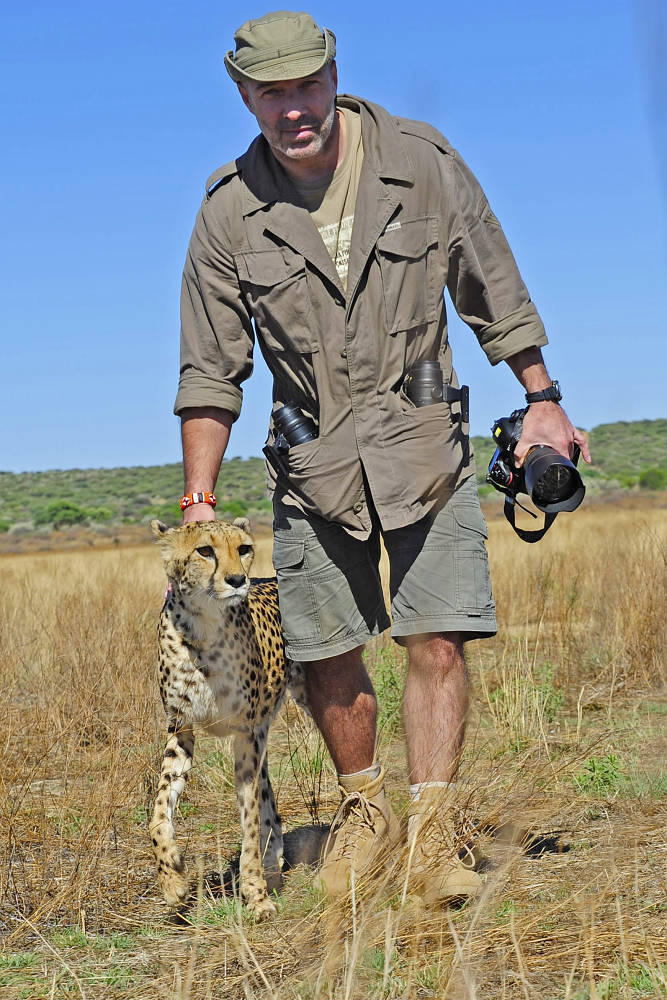
People can hardly imagine what the photos are. It is almost impossible to take a top picture of an animal. The animal is not human, it wont cooperate. In addition, it’s not enough to find the animal. You have to catch the right light, a great angle, the action… If you want to catch a lion well, sometimes it means spending a few hours over a carcass, where butchers’ flies hover around your mouth.”(laughs).
… It’s surprising that you bravely resist all those diseases there.
“Don’t worry, I'm protecting myself. I have all the vaccinations, but I haven't been taking any antimalarials since 2006. Otherwise, I try to deal with it by taking chili and plum brandy. I have plum brandy or something local on a hungry stomach every morning in the tropics. Sometimes it's quite a force to drink hot plum brandy, but the worm burns in it reliably. After all, ‘hot’ works all over the world…”
How did Peter say it? Strong experiences are well remembered. And I'm going to have this conversation, which lasted for two hours, in me for a long time. In the best sense of the word!
Petr Slavík on social networks:
Web
Facebook
Instagram
Safari with Petr Slavík
He doesn't just love his job - he lives it. But he still has enough energy to do a lot of other, crucial things. For example, for his nine-year-old daughter, who experiences each of his expeditions as
the right caring lady.
 "My daughter is watching over me. There were times when my departures were accompanied by hysterical scenes. That's because I said goodbye. And so I learned to run," says Petr, and then adds that it is all the more beautiful to return. Moreover, he never goes on his solo trips alone: “Every trip, something has secretly sneaked into my backpack. Mostly stuffed animals who are supposed to accompany and protect me," he laughs, and sincere joy is reflected in his eyes.
"My daughter is watching over me. There were times when my departures were accompanied by hysterical scenes. That's because I said goodbye. And so I learned to run," says Petr, and then adds that it is all the more beautiful to return. Moreover, he never goes on his solo trips alone: “Every trip, something has secretly sneaked into my backpack. Mostly stuffed animals who are supposed to accompany and protect me," he laughs, and sincere joy is reflected in his eyes."If you were alone, would you stay in Africa?" That fairly logical question comes to my mind. Of course he stayed. Where else could one feel happy and free, claiming that if he were to live someone else's life, it would be George Adamson? "I may end up in Botswana one day, it's my favorite place, but I'm absolutely not willing to give up my daughter's childhood because of Africa," he said. Like I say, this guy is a real fair player…
Where did your initial impulse to explore the wilderness come from? Did someone in your family introduce you to this?
“I didn't have a pedigree, so I don't know if anyone has not fished in Africa in the past, but I probably broke the family mould. I grew up with my grandmother outsidea village, on the very edge of the forest, and that shaped my relationship with Nature. Then, definitely, adventure books. My grandmother used to read them to me, then I read them myself - and I also like to read to my daughter very much. Somewhere during browsing through The Jungle Book and May Day, it was all born.”
Are you a free-spirited soul? I guess you have to be ...
“Now I can say what kind of soul I am, but it’s difficult to describe the soul of a ten-year-old boy. I just wanted to be among the animals… a real headache. I remember, for example, how I sewed a loincloth at the time, that I would run through the woods like Tarzan. So yes, the desire for freedom was there. And my grandmother also gave me considerable freedom.”
Did she also take you on your first trip?
“I went there in the early summer of 1990. I said I would hitch a ride to Africa. Grandma didn't swear, she just said, ‘That's amazing, but take care of yourself’. That journey was an incredible episode... the discovery of the Western world, something unthinkable until then. I drove through Europe as it was opening up and was not surprised. A man got to the road to Prague in the morning and the next day before five he was at the Eiffel Tower!”
I can't imagine that today…
“Yeah, today hardly anyone would stop.”
How did you agree to this expedition? Did you speak any foreign languages?
 “I learned some English at the gym, so I had the basics, but in practice it was impossible to use it. I learned to speak as I walked along. My second trip led me to Argentina, where I went with my classmate from elementary school. We learned Spanish along the way, and that was incredible. We lived in the ditches, in the mountains, fishing,… It was a powerful experience that literally kicked me
“I learned some English at the gym, so I had the basics, but in practice it was impossible to use it. I learned to speak as I walked along. My second trip led me to Argentina, where I went with my classmate from elementary school. We learned Spanish along the way, and that was incredible. We lived in the ditches, in the mountains, fishing,… It was a powerful experience that literally kicked mein the butt. Then came other journeys that I then completed myself, namely Chile, Bolivia,… it was the best language and life school.”
Quite an idyll, yes? But as the sky is not without clouds, there are no paths without obstacles. And so I soon learned how Peter reached the very bottom when he got lost in the Andes, ran out of water, got some alpine disease and survived only by a miracle. "To this day, when I close my eyes, I see the endless night sky in the desert mountains. I was lucky to struggle to the rescue cabin and that's where the check came, which comes about twice a year. They had already taken care of me, " he recalls, and I feel relieved for him as well. "I bought grilled chicken and beer there with the dollars I’d saved, and I felt like a king," he says indulgently.
Nevertheless, this experience didn’t shake him in such a way that he’d feel real, genuine and utterly crippling fear. This moment came another time:
"I was almost dragged to my death by a horse in Kazakhstan. We shot the documentary series In the Footsteps of a Predator there. The horse got scared, my foot remained in the stirrup, it completely skinned my leg. The moment hooves and grass flew around my head, I was terribly scared. I was afraid I wouldn't see my daughter again. That was the biggest fear I’ve ever had. At the time, I really thought it was all over for me. "
Some of your experiences are really quite painful. And probably not just for the body…
“Yes, this one was sore in every way. It didn't end with the accident itself. When I woke up, I had to get on that horse again and ride it to Kazakh hospital. Staying at the facility there was perhaps even worse than what had preceded it. I woke up on my back, without clothes, with a sheet stuck to my wounds. I had to take a shower for a long time just to get it off…”
So you prefer to avoid horses by keeping your distance?
“On the contrary! I deliberately try to keep practising so as not to create a block. Unfortunately, so far no one has taught me that much😊. Ale zase dobře padám.
I have one thing to say here. If there is anything wrong with Peter's story, it’s his respect, humility and courage. You would have to be have been here to see his gestures and hear the composure in his voice. No, these really aren't stories made for the readers of magazines. This is life, real life. Of course, Peter tells his actual, raw life, and you feel as if you’ve experienced it with him. The Ideal bushman, I think again… And as long as I've been thinking, I've been quiet for a long time too. Peter does not enter my thoughts, he gives me space. And suddenly I have a question completely outside the themes that we’ve been sticking to so far:
And what about a bear? What should we do when if we were to meet onr? Ring a bell? Freeze? Scream? Play dead?
And again his composure! Hardly mentioning a man who gets buried in the snow, waiting for the arrival of a Siberian tiger. And so it occurs to me:
Adrenaline is your daily bread, yes? Are you looking for it when there’s a shortage of it?
“I partly like it, but you can't say I'm out looking for it. I move in places where there is simply a slightly higher concentration of the stuff 😊. But I also like the feeling of well-being during expeditions. For example, such safari camps with people for whom I can be a guide - It’s pleasant relaxation for me. Especially evenings. You’re comfortable, while all around you are the sounds of the African night, having good food and drink…”
But how do you get this across to ordinary people?
“Humility towards Nature is fundamental. When I drive people around Africa on safari, I teach them that this area belongs to the animals that will kill them if they cross their borders. There are a lot of principles that Man, in Nature, especially in the wild, must follow…."
 And they observe these rules?
And they observe these rules?“Usually the first two or three days. A man who is used to the city and suddenly finds himself in a tent in the middle of Africa is tame. Frightened and tame because he is in the unknown. The first night he usually doesn't even sleep (laughs). The third day comes a turning point and also the first mistakes. All you have to do is run around and the animal, which would not otherwise even notice you, may attack. And it doesn't have to be a beast at all. Errors of inattention are simply not forgiven.”
To go on Safari with Petr Slavík.
“Do you hear, Santa? ... An unforgettable experience. Memories you draw from all your life. And these beautiful plans are not hindered by anyone. A pandemic, for example.”
How did you get on when Covid was roaming the world? For travellers, a pretty decent line through budget, I reckon?
“I sat on my ass for a year. A lot of people take it mentally, whether they are dealing with booze or in other ways. It's terrible.”
Terrible - even for animals?
“Now that I've been to Africa in October, a lot of the camps there are empty, vacant. And this is a really difficult situation, because these are areas that depend on tourism. It's probably better for the animals, but there’s no one to protect them. And there’s no time. And that's too bad. After all, just the population of lions has fallen by as much as 95% since 1943. The prognosis is that the lion in the wild will disappear by 2050… And this is a topic that is not completely addressed in society. Almost no one cares about the extinction of an animal species that has accompanied mankind since time immemorial.”
 Unless some popular influencer took a picture with him…
Unless some popular influencer took a picture with him… “Yes, that would be a clever marketing move. In this, the world is completely gone. Take pictures with an animal I don't know anything about, just for the number of likes. What's worse - taking pictures with the trophy, or – of course - hunting directly. I understand regulatory hunting or for a living, but photos with a dead baboon just for fun… that's just beyond.”
“Beyond the edge... the world is not so slowly going over the edge, I think, but I'd rather not say anything out loud. I don't want to spoil this beautiful and inspiring moment”. I glance at Peter's face and see that he’s thinking the same thing. The Pandemic: a divided society. Animals that can't do anything about it.
What are your plans for this year? - I ask after a moment. A bold question given that we just don’t know what will happen tomorrow, let alone throughout the year…
“Apart from Zambia, where I’m going on an expedition with clients, I have been planning an expedition to the Arctic for two years now. Maybe it will finally work out. I would like to get somewhere on the 80th parallel and during the cruise I took pictures of animals and nature, which a lot of people think is boring. But when the sun shines right into it, it's a beautiful sight! In October, I would like to go on a tent safari in Botswana. This is absolutely a TOP place for photography.”
Oh yes, your photos! They should definitely get in our conversation somewhere. These are amazing moments. And a layman can hardly imagine what is behind getting them...

People can hardly imagine what the photos are. It is almost impossible to take a top picture of an animal. The animal is not human, it wont cooperate. In addition, it’s not enough to find the animal. You have to catch the right light, a great angle, the action… If you want to catch a lion well, sometimes it means spending a few hours over a carcass, where butchers’ flies hover around your mouth.”(laughs).
… It’s surprising that you bravely resist all those diseases there.
“Don’t worry, I'm protecting myself. I have all the vaccinations, but I haven't been taking any antimalarials since 2006. Otherwise, I try to deal with it by taking chili and plum brandy. I have plum brandy or something local on a hungry stomach every morning in the tropics. Sometimes it's quite a force to drink hot plum brandy, but the worm burns in it reliably. After all, ‘hot’ works all over the world…”
How did Peter say it? Strong experiences are well remembered. And I'm going to have this conversation, which lasted for two hours, in me for a long time. In the best sense of the word!
Petr Slavík on social networks:
Web
Safari with Petr Slavík










